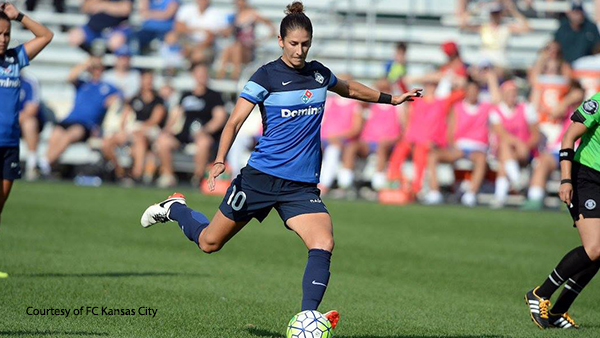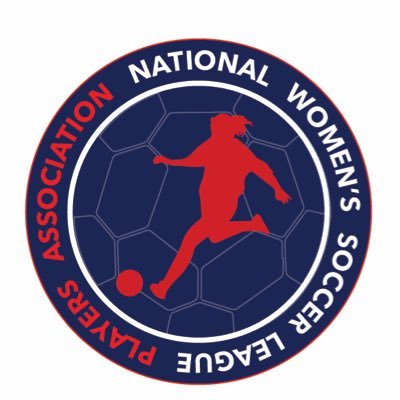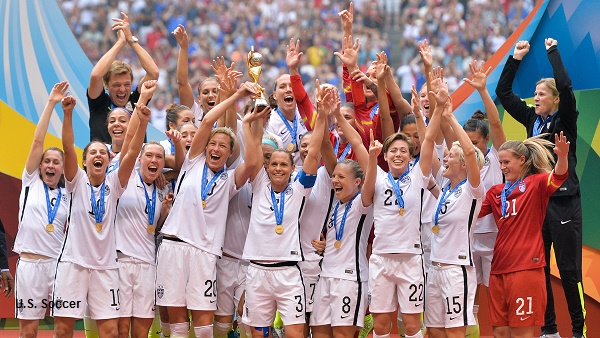Q&A: Yael Averbuch on the creation of new NWSL Players Association

In generally positive health as its fifth season unfolds, the National Women’s Soccer League has outlasted its women’s professional predecessors and fueled hopes of long-term viability on the crowded North American sports landscape.
 One area in which the NWSL has lagged behind both its male counterparts and its forbears WPS and the WUSA, however, is worker mobilization. Outside of the star-studded U.S. Women’s National Team, players have yet to form a union or bargain collectively; perhaps that’s a factor in why salaries for the rank-and-file are threadbare and several kerfuffles have erupted over playing and working conditions since the league’s founding in 2012.
One area in which the NWSL has lagged behind both its male counterparts and its forbears WPS and the WUSA, however, is worker mobilization. Outside of the star-studded U.S. Women’s National Team, players have yet to form a union or bargain collectively; perhaps that’s a factor in why salaries for the rank-and-file are threadbare and several kerfuffles have erupted over playing and working conditions since the league’s founding in 2012.
But NWSL players took a major step in that direction a few weeks ago, announcing the formal creation of the NWSL Players Association, vowing “to build on the opportunity that has been afforded to us, as well as work to achieve those goals that have not yet been attained” and “do all in our power for the betterment of our members so that we may best contribute to the common goal: a world-class product on the field, and to be role models and inspire the next generation off the field.”
[FOR IMMEDIATE RELEASE] NWSL Non-Allocated Players Announce the Formation of a Players Association pic.twitter.com/ctENUDTtyC
— NWSL Players Assoc (@NWSL_PA) May 15, 2017
FC Kansas City veteran and former USWNTer Yael Averbuch is one of the leaders of the push to create the NWSLPA, and she recently spoke in depth with SoccerWire.com about the process behind the association and what the future may hold.
SoccerWire.com: How and why did the NWSLPA get going? Why now?
Yael Averbuch: For a while we as players have been working to create good chain of communication and organize ourselves so we make sure we’re all on the same page and forming a good, open relationship with the league office, which we’ve done. And they’ve been awesome in terms of hearing us and communicating openly with us.
So we had a really informal system in place where we had a contact or two with each team, that way we could filter information out to the players. And vice versa, if there’s something going on at a club it could get filtered up and directly to the league office. It’s always been the goal to formalize that a bit more.
All the players are extremely supportive – but it is a feat to get everyone on the same page, for sure! So I’m really proud of everyone who’s involved, and the leaders on each team who have tirelessly distributed information, forwarded emails, making sure each team took the time to vote and get representatives elected.
SW: What does the organizational structure look like so far?

YA: Each club has two player representatives and an alternate. And eventually from that group we will elect officials. We need a president, vice president and so forth.
Basically every team has had at least one, two, sometimes three or four players who have been a really integral part and part of the conversation from the beginning. That was even started a couple of years ago when we established a really good working relationship with Jeff Plush when he was the commissioner.
SW: Where do things stand with collective bargaining? Will we see that process in the near future?
YA: We don’t have a timeline on that, and I am not that familiar with labor law, and really kind of need to look into that part of it! But the concept is that this players association is the group that will take those steps together.
So if we have really good organization, when it comes the time to sign the union cards and communicate about the importance of the union, collect dues, select a lawyer to represent us and get into the collective bargaining, at that point we’ll already have formed a really strong communication and also a very positive relationship with the league front office.
We do need a players union and that will happen, but we want to make sure we do it right … if that can be as soon as next year, awesome. If that’s too much of a stretch and we can’t do it right by then, then I think it’ll have to be pushed off.
SW: How did you personally get involved with a leadership role? Have you done anything like this before?
YA: Good question – no! I’ve never done anything like this. To be honest, my point is that with unions and organizations of employees and such, very often a group gets organized and comes to ownership with demands and there’s kind of a negative connotation with organizing a union. From my perspective it was really important that it wasn’t done like that.
So I had a lot of conversations with people that were involved with the WPS players union, with the league front office, with the other players and also with Bob Foose, the executive director of the MLS Players Union. With all this information, I felt really strongly that someone needs to take charge who was going to keep it really positive, rather than focus on making demands and things like that.
We’re all very aware that this league needs to make continual improvement, but we want to be a group that offers creative solutions and is part of the solution, rather than creating conflict … I’ve gotten a lot of help already and the other players have been awesome, but we’re definitely going to need to put it into the hands of the experts.
SW: Where do you think things stand in terms of the players’ collective mindset at this point in the NWSL’s history? We occasionally hear about frustration and dissatisfaction with working conditions, and low salaries too, of course.
 YA: It’s a startup league and a growing league, and I think that everyone involved, from the players all the way up through the front office, believe that there are things that need to be made better. Salaries over time absolutely have to improve, otherwise we’re going to lose players to other career paths, and some of the best talent in the country is going to choose to retire young. Which has happened. Facilities, the standards overall have to be addressed and improved.
YA: It’s a startup league and a growing league, and I think that everyone involved, from the players all the way up through the front office, believe that there are things that need to be made better. Salaries over time absolutely have to improve, otherwise we’re going to lose players to other career paths, and some of the best talent in the country is going to choose to retire young. Which has happened. Facilities, the standards overall have to be addressed and improved.
But that’s not something that anybody involved is oblivious to. The ownership of the clubs know it, the GMs know it, the staff of the clubs and of the league know it. And as players, we’re the ones living it. When there are issues that are outside the norm and are going to cost money to fix, absolutely they need to be addressed, and those are the kind of things that we will bring forward. And the league has been very responsive in terms of working to address those.
But we also realize that it’s a slow process. Those things take money and they take time. So that’s a not-so-positive spin on it: Those things are not going to go away overnight.
SW: You’re in a pretty unprecedented position in terms of having separate represention for the league’s biggest stars, the USWNT. Would it be better to have everyone in the same organization? Could that happen someday?
YA: Eventually I think that will change, but right now it’s actually an interesting piece of the puzzle for us. Because we actually have a different employer than those players. Ideally we would all be part of the same players union, we would be having all the same conversations. But because we have different employers [NWSL clubs vs. the U.S. Soccer Federation], we have to in some sense be separate.

We’ve spoken a lot with the national-team players and they’ve been extremely supportive, and we’ve had conversations about, ‘can we combine?’ But at the end of the day right now just purely because of the way labor law works, we have to have a separate representation and players assocations and so forth. It’s certainly our aim to work with them and they’ve been a very strong voice in the media and speaking out on our behalf. I know in their collective bargaining agreement, they included a lot of things that helped the league.
Right now U.S. Soccer is supporting the league in a large way and by paying those star players’ salaries, it takes a huge burden off the club owners. So right now it’s completely necessary and we appreciate it. We all know that this [league] couldn’t happen without it being like that. But the natural progression would be that over time, as the clubs grow in terms of visibility and success, ticket sales, corporate sponsors, all those things, they will eventually be in a place to pay those salaries for those players. At that point we will all have the same employers. Yes, that would be ideal – but for now it’s wonderful that it’s not that way, because it allows for the league to exist!
SOCCERWIRE MARKETPLACE
- MANCHESTER CITY SOCCER CAMPS
- FC Bayern Soccer Camps - $30 PROMO CODE: BMSOCCERWIRE
- Real Colorado Cup 2026
- Join a College Coaches Showcase Camp Today
- MICFootball Punta Cana 2026
- Dana Cup Hjørring 2026
- 15th Annual Loudoun Soccer College Showcase
- OFFICIAL FC BARCELONA SOCCER CAMPS - PROMO CODE: FCBSOCCERWIRE
- New England Copa Surf 2026
- Adidas National Cup 2026











